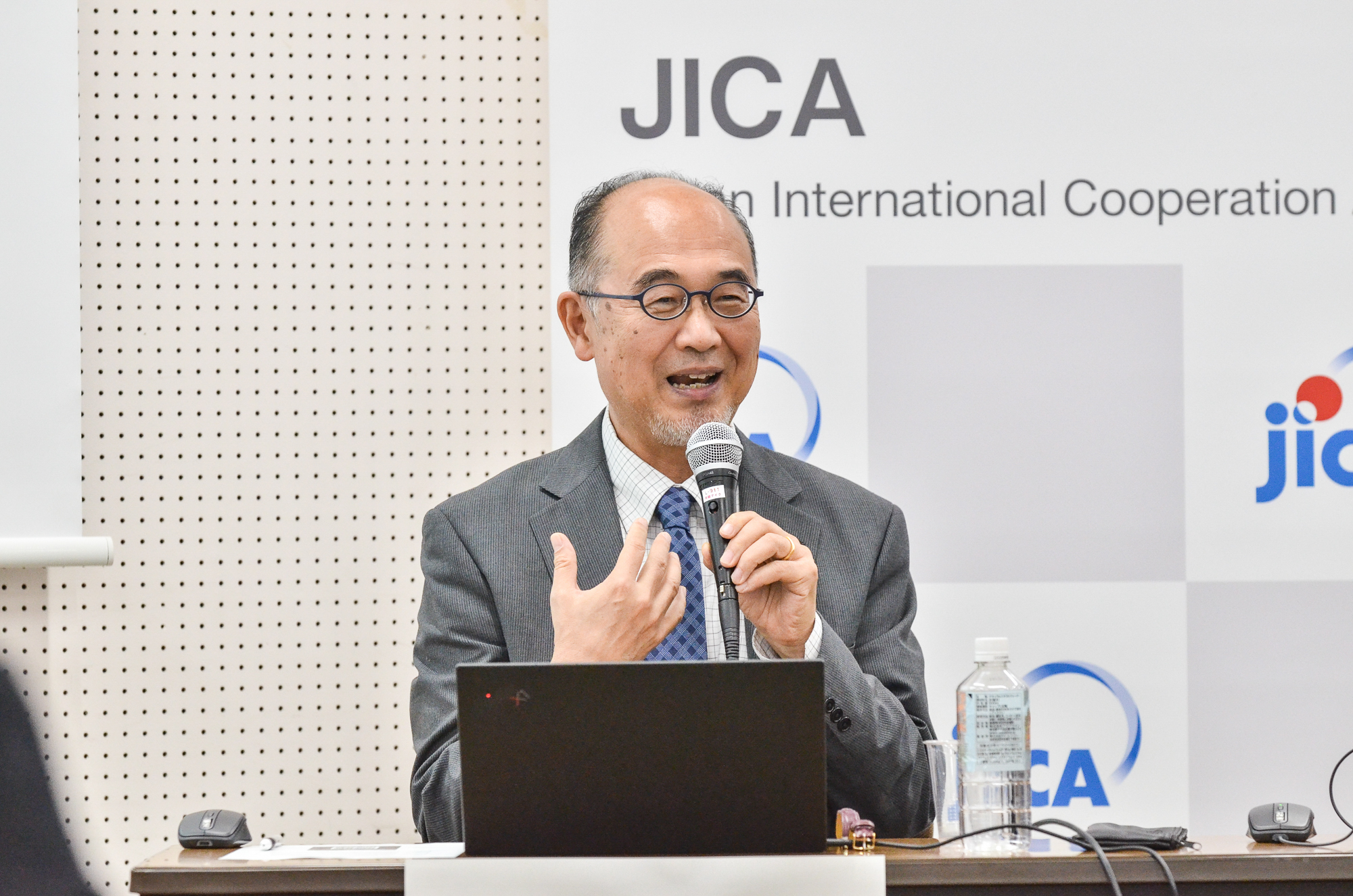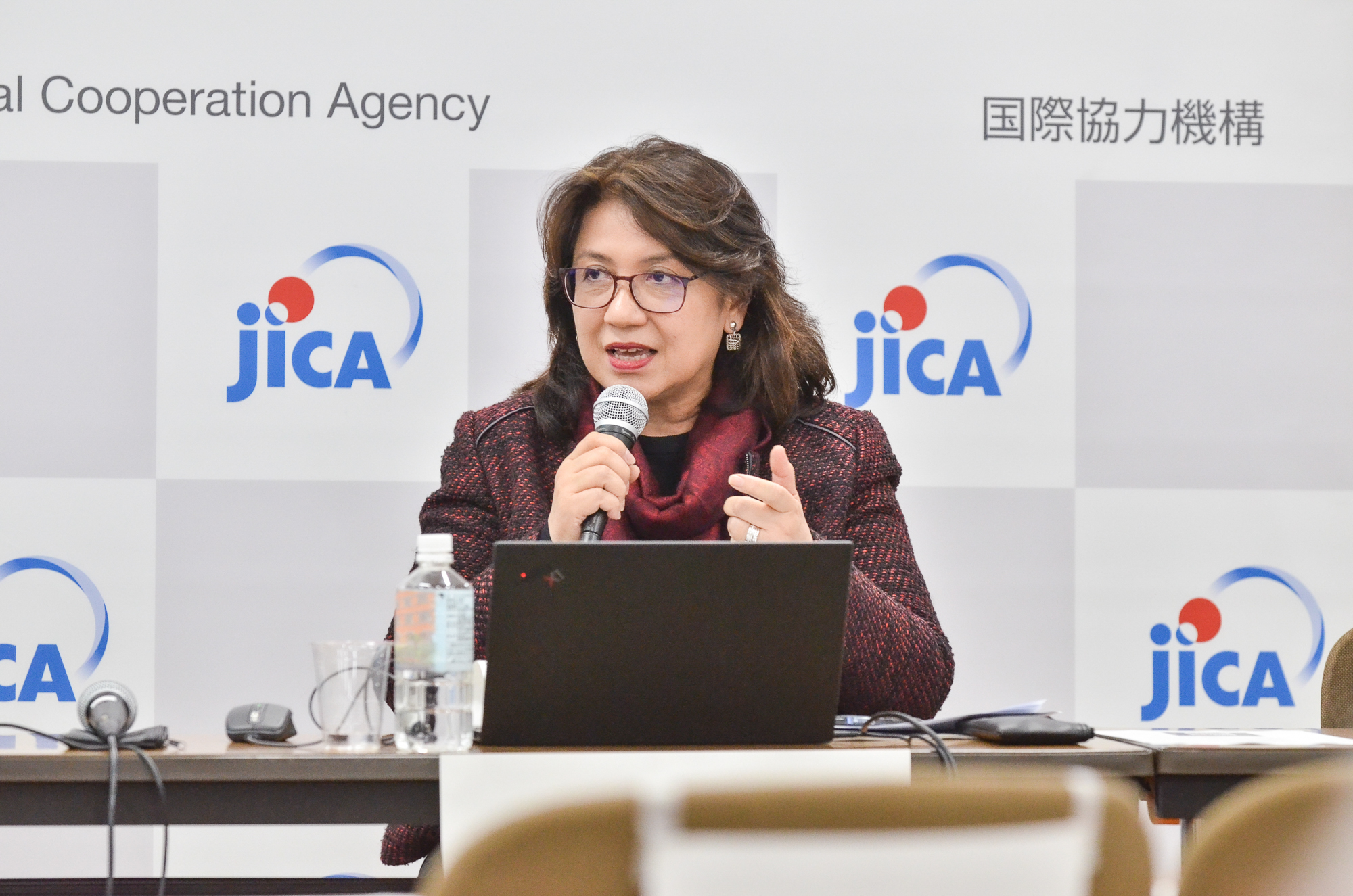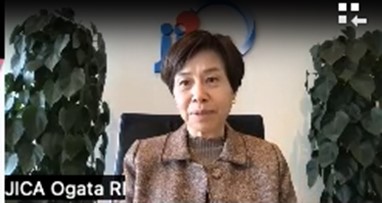Book Launch Discussion “Human Security and Empowerment in Asia: Beyond the Pandemic”
2024.01.22
The impact of the COVID-19 pandemic has significantly contributed to a considerable setback in global development and has highlighted the unprecedented challenges it presented to human security. Given the growing complexity of human security threats, the JICA Ogata Sadako Research Institute for Peace and Development has conducted the research project "Human Security and the Practices of Empowerment in East Asia" since 2019, which culminated in the recent publication of a book titled, “Human Security and Empowerment in Asia: Beyond the Pandemic.”
On Nov. 30, 2023, the JICA Ogata Research Institute, in cooperation with Sophia University, convened a book launch seminar at Sophia University in Tokyo to share findings of the research project that focuses on the unique empowerment narratives of specific vulnerable populations within the Southeast Asian region and Japan. Following welcome remarks by Miyahara Chie, director general of the JICA Ogata Research Institute, and Aoki Ken, director of the Sophia Institute for Human Security, three editors discussed how lessons learned so far could help us move towards human security.
Mine Yoichi, executive director of the JICA Ogata Research Institute and co-editor of the book, began with an overview of the preceding human security research project covering 11 Asian countries. The research combined the efforts of nearly 50 scholars and development practitioners, and incorporated document research, stakeholders’ interviews, and fieldwork. Mine expounded on the previous research findings, noting that international assistance is accepted only when mutual trust between stakeholders is consolidated during times of peace. He also emphasized the significance of horizontal coordination, but pointed out that vertical communication through scrutinizing grassroots voices is essential. Finally, he bridged the past and current human security projects by highlighting the necessity to explore and redefine the complexity of major threats to human security. He emphasized that the COVID-19 pandemic is not an isolated event but should be viewed in the context of increased human impact on nature.

Mine Yoichi, executive director of the JICA Ogata Research Institute
Mely Caballero-Anthony, professor at Nanyang Technological University and co-editor of the book, described how the global crisis of the COVID-19 pandemic had cross-cutting impacts on economic security, food security, environmental security and personal security. She then shared some case studies of empowerment among specific vulnerable groups featured in the book. In the Indonesian case study, a program of emergency cash transfers has proven to be the most efficient means to address hunger and eventually led to improved business skills for the beneficiaries. The speedy housing program has also provided an enabling environment for displaced communities, consequently helping them build capacity and resilience. Caballero-Anthony concluded that while vulnerable communities need protection, they have substantially shown an active and positive role in shaping an inclusive transformational process that engenders empowerment.

Mely Caballero-Anthony, professor at Nanyang Technological University
A pre-recorded presentation by Ishikawa Sachiko, who is a visiting fellow at JICA Ogata Research Institute, professor at Ritsumeikan University, and co-editor of the book, was to be played during the seminar but due to technical issues, this was not possible. Her presentation centers on empowerment as revealed in the eight case studies from the book. Below is the outline of her presentation: The case studies have shown that there is no single model for empowerment and that differences in terms of class, ethnicity, religion and gender make empowerment strategies vary. When responding to possible new pandemics in the future, we need to be attentive that preparation is necessary in normal times, genuine support should reach the most vulnerable, and efforts to promote human security through the combination of empowerment and protection should be strengthened.
(A video of this seminar, including Ishikawa's presentation, is available at the link at the bottom of this page.)

Ishikawa Sachiko, visiting fellow at JICA Ogata Research Institute
Comments on the book were given by Adachi Kenki, professor at Ritsumeikan University, and Shimada Tomoko, director of the Office for Peacebuilding, Governance and Peacebuilding Department in JICA. Adachi agreed with the arguments provided in the book that existing research about human security predominantly focuses on the conceptual evolution of the term, while insufficiently addressing the practicalities of protecting and empowering human security. Thus, he believes that the captioned publication is invaluable for directly addressing issues surrounding protection and the empowerment. Nevertheless, he thinks that the book focuses much on top-down/governmental empowerment, while it might overlook the significance of bottom-up empowerment. On the other hand, Shimada indicated that the findings of the book are compatible with the efforts of the practitioners in the field, citing the example of JICA’s cooperation approach to building the capacities of local administrators in vulnerable areas. Book editor Mine and Caballero-Anthony accepted and responded to the comments, acknowledging that such feedback was compliments, motivating further examination of human security and empowerment.
The event recording is available by clicking below.

事業事前評価表(地球規模課題対応国際科学技術協力(SATREPS)).国際協力機構 地球環境部 . 防災第一チーム. 1.案件名.国 名: フィリピン共和国.

事業事前評価表(地球規模課題対応国際科学技術協力(SATREPS)).国際協力機構 地球環境部 . 防災第一チーム. 1.案件名.国 名: フィリピン共和国.

事業事前評価表(地球規模課題対応国際科学技術協力(SATREPS)).国際協力機構 地球環境部 . 防災第一チーム. 1.案件名.国 名: フィリピン共和国.

事業事前評価表(地球規模課題対応国際科学技術協力(SATREPS)).国際協力機構 地球環境部 . 防災第一チーム. 1.案件名.国 名: フィリピン共和国.

事業事前評価表(地球規模課題対応国際科学技術協力(SATREPS)).国際協力機構 地球環境部 . 防災第一チーム. 1.案件名.国 名: フィリピン共和国.
scroll